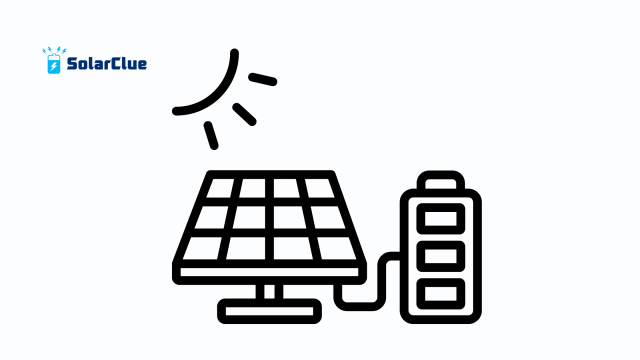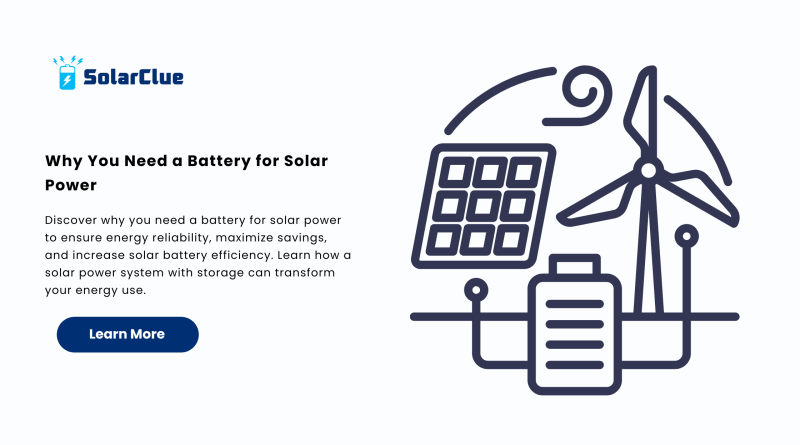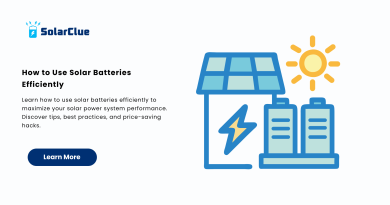Why You Need a Battery for Solar Power
Harnessing the sun’s energy through a solar power system is one of the most sustainable choices homeowners and businesses can make today. But while solar panels generate electricity during daylight, what happens when the sun goes down? This is where the battery for solar power becomes essential. Adding a solar battery allows you to store excess energy and use it whenever needed—giving you more control, efficiency, and peace of mind.
Table of Contents
What Is a Solar Battery?
A solar battery stores the unused electricity generated by your solar panels. Instead of sending surplus power back to the grid, the battery saves it for nighttime use, cloudy days, or power outages. This increases the self-reliance of your solar power setup and helps you get the most out of your renewable investment.
Why You Need a Battery for Solar Power
1. 24/7 Power Availability
One of the biggest advantages of using a battery for solar power is the ability to use stored energy even when the sun isn’t shining. Without a battery, your home relies on grid power during the night. With a battery, your solar power system becomes a more complete and independent energy source.
2. Energy Security During Outages
Power cuts are common in many areas. Having a solar battery ensures uninterrupted power supply to essential appliances. It provides backup power, keeping your lights, fans, Wi-Fi, and other essentials running without any disruption.
3. Reduce Electricity Bills
With solar battery capacity aligned with your energy consumption, you can use your stored energy during peak hours when grid electricity is expensive. This reduces your dependency on the grid and slashes monthly bills.
4. Optimize Solar Battery Efficiency
Using energy during daylight and storing the rest boosts your system’s solar battery efficiency. Instead of wasting excess energy, it’s stored and used intelligently, making your setup more cost-effective over time.
5. Go Off-Grid or Hybrid
Adding a battery for solar power enables off-grid living. Whether you choose a hybrid or completely off-grid setup, the battery bridges the gap between sunlight availability and your energy needs, giving you total energy freedom.
6. Support for Net Metering
In some areas, net metering credits are low or not available. Instead of relying on policies that may change, storing your energy locally in a solar battery gives you more reliability and control over your solar usage.

Choosing the Right Solar Battery
When selecting a solar battery, consider these key factors:
a) Solar Battery Capacity
Measured in kilowatt-hours (kWh), this indicates how much energy your battery can store. Choose a battery with enough capacity to meet your nightly or backup needs.
b) Solar Battery Efficiency
Also known as round-trip efficiency, it shows how much energy is lost in the storage process. Higher solar battery efficiency means less waste and more usable energy.
c) Depth of Discharge (DoD)
This defines how much of the battery’s energy you can use without reducing its lifespan. Look for batteries with a higher DoD for more usable capacity.
d) Cycle Life and Warranty
The lifespan of a solar battery is measured in cycles. More cycles mean longer life. Always check the warranty—good batteries come with 10+ year warranties.
Solar Power System with Battery: Use Cases
Residential Homes benefit from lower electricity bills, backup power during outages, and greater energy independence.
Remote Areas with unreliable or no grid access depend on a solar power system with battery for consistent power.
Businesses can reduce demand charges and operate uninterrupted during blackouts with a reliable solar battery setup.
Common Myths About Solar Batteries
Myth 1: Solar Batteries Are Too Expensive
Prices have come down significantly. With falling costs and government subsidies, investing in a solar battery is now more affordable than ever.
Myth 2: Batteries Don’t Last Long
Modern lithium-ion batteries offer long lifespans—typically 10 to 15 years—making them a durable part of your solar power investment.
Myth 3: Only Off-Grid Systems Need Batteries
Even if you’re connected to the grid, a battery for solar power enhances reliability, savings, and sustainability.
Are Solar Batteries Worth It?
Absolutely. When you consider the long-term savings, enhanced solar battery efficiency, and energy independence, a solar power system with battery storage is one of the smartest decisions for homeowners and businesses alike. As electricity prices rise and blackouts become more frequent, a solar battery becomes not just useful—but necessary.
FAQs
Q1: How long can a solar battery power my home?
It depends on your solar battery capacity and your energy usage. A typical home battery can power essentials for 8–12 hours.
Q2: Can I add a battery to my existing solar power system?
Yes. Most systems are compatible with battery retrofits, though you should consult an expert to match specs.
Q3: How much does a solar battery cost in India?
Prices vary by brand, capacity, and type. On average, it ranges from ₹50,000 to ₹2,50,000 depending on size and technology.
Q4: What is the best solar battery efficiency to look for?
Look for batteries with 85–95% round-trip solar battery efficiency for optimal performance.
Q5: How many batteries do I need for my solar power system?
This depends on your daily usage and storage goals. A professional can assess your load and suggest the ideal number of batteries.
Conclusion
If you’re serious about maximizing the benefits of your solar power investment, adding a battery for solar power is no longer optional—it’s essential. Whether you’re aiming for energy independence, uninterrupted power, or better savings, a solar battery is the backbone of a complete and future-ready solar power system. To explore top-rated batteries, expert guidance, and unbeatable deals, visit solarclue.com or explore our knowledge hub at blog.solarclue.com and take the next step toward smarter solar living.




